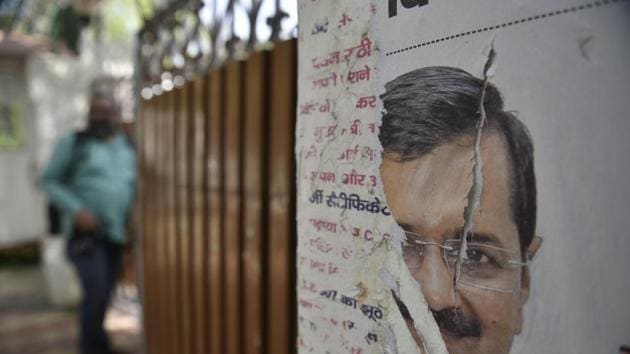AAP’s midsummer night’s dream has failed, especially in Delhi’s schools
AAP’s first attempt at running Delhi lasted 49 days. In mid-February, 2014, when Arvind Kejriwal resigned, many were disappointed but few were disillusioned. This is why the dream mustered a second run, a year later. Political circumstances were tougher this time, but the AAP dream came back with stunning passion. Two years on, the memory of that victory fills the mind with a sense of loss – of time and faith.
The defeat of Aam Aadmi Party (AAP) in the recent municipal elections in Delhi marks the end of an unusual dream. Normally, you see a dream just once; if you wake up in the middle, you can’t continue it when you go back to sleep. The special thing about the AAP dream is that people dreamt it twice.

Its first run lasted 49 days. In mid-February, 2014, when Arvind Kejriwal resigned, many were disappointed but few were disillusioned. This is why the dream mustered a second run, a year later. Political circumstances were tougher this time, but the AAP dream came back with stunning passion. Two years on, the memory of that victory fills the mind with a sense of loss – of time and faith. AAP was hardly a political formation; it was the energy its birth and surge had emitted that mattered.
Within weeks, the spirit started to mutate. In a drastic move, the party expelled three of its eminent colleagues, known for their intellectual acumen. The government started fighting with the Lieutenant Governor over one after another question of turf. Education was outside this turf war. Rescuing Delhi’s crumbing system of education presented a positive opportunity for the AAP government to show its spirit.
It did grab this opportunity, but used it in bizarre ways to deepen the mess. It ignored the state’s own pedagogic institutions and outsourced the reform agenda to mega-NGOs. Technological solutions were favoured over confidence-building among teachers. No one could dare to criticize, for the price of candour was high.
Two decisions are worth going into some detail. One was to cut down 25% of the syllabus and textbooks, ostensibly to reduce curriculum load. No one in power seemed to know that the textbooks currently in place were designed—by the country’s apex advisory body—specifically to solve the problem of curricular burden. Precious time and effort was wasted to identify dispensable lessons. Experts who resented the decision to delete chapters were charged of being out of touch with reality.
Then came the decision to divide school children into three separate groups on the basis of their academic performance. Someone had apparently just discovered the miracles of ability grouping. This idea had died overseas half a century ago, but Delhi didn’t mind using it to experiment with children of the poor. My own trainee teachers told me how humiliated and alienated the children placed in the third group—euphemistically named ‘vishwas’—felt at school.
Two months ago, I was pleasantly surprised to receive a packet containing past exam papers used in elementary classes. The covering letter wanted me to analyse them and suggest alternatives. My submission was never acknowledged. I first attributed this to the Punjab elections. Later, I felt exam reform must be another passing thought.
AAP’s failure to handle education may be a matter of perception. Delhi’s dwindling greens and smog offer a clearer case of loss of interest. The Yamuna, the various gardens and parks, the ridge—Delhi has so much nature worth saving. But the city couldn’t even save its core icon: the ‘Hall of Nations’. It was recently razed to dust overnight though a court had allowed further hearing. The smog will ensure that passers by will not miss the beautiful structure. Its architectural glory must live on in a postal stamp that marked its creation.
The current phase of our aspiration for glory began with the 2010 Commonwealth Games. The Congress was firmly in command of Delhi government. Its elderly leader rejected all criticism of the demolition drive initiated by builders of new structures. In the altered city, AAP’s election victories felt as if a patient was determined to scream despite a broken heart.
You need not be a political pundit to figure out that AAP was a party only in name. It will be equally wrong to conclude that it was a movement. AAP’s second victory was a mid-summer night’s dream. Even in memory, it feels nice to have been fooled, by nobody other than one’s own human right to hope. Historian Rajmohan Gandhi was reported to have said that the atmosphere surrounding AAP’s surge was reminiscent of the 1920s. He was right, though not accurate. After the Commonwealth Games’ disaster, AAP gave Delhi a moment of fantasy. The recent municipal elections imply that the fantasy has passed. If the city wants to exercise its imagination again, it must recreate a sense of community, but this can’t be a political project.
Krishna Kumar is former director, NCERT, and professor of education at Delhi University
The views expressed are personal



